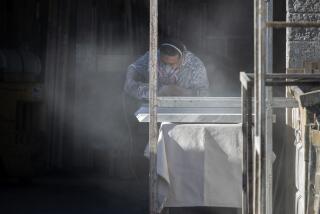California workplace safety board is accused of pro-business bias
- Share via
The head of the state Senate’s Labor Committee accused a workplace safety board Wednesday of being biased toward employers and ignoring a law that requires fines for failing to report on-the-job injuries.
After a hearing, Sen. Mark DeSaulnier (D-Concord) said he might introduce legislation that could lead to criminal charges against board members if they continue to disregard the law that calls for a $5,000 fine for employers’ failing to report accidents in a timely manner.
The hearing came after a Times investigation last fall that found that the California Division of Occupational Safety and Health appeals board repeatedly dismissed and reduced the penalties levied by division inspectors, even in situations in which workers had died or were seriously injured.
“I’m concerned that it at least appears there may be a prejudice toward the employer,” said DeSaulnier, who added that he found Wednesday’s testimony from state officials, labor advocates and business interests “very troubling.”
“We are not biased,” said Candice Traeger, head of the appeals board, which decides disputes between inspectors and employers. She said her critics have used “misinformation” to wage a campaign against her.
The Times story highlighted the case of Bimbo Bakeries, in which five employees lost fingers or parts of fingers, and one lost an arm, in separate bakery accidents in which inspectors found similar safety violations.
In several of those cases, the appeals board dismissed citations or reduced the fines by thousands of dollars. It also did not require the company to address dangerous conditions.
Also last year, a quarter of Cal/OSHA’s inspectors and district managers complained that its “deterrent effect has been significantly undermined as employers learn they can ‘game the system’ ” partly through appeals.
In January, the U.S. Department of Labor, which oversees Cal/OSHA and other state occupational safety programs, notified state officials that it had launched a “special study” to look into the concerns raised by the inspectors and “the handling of the Bimbo cases.”
If the audit finds problems, federal officials can work with the state to fix them or, in extreme cases, take over parts of Cal/OSHA’s operations.
Len Welsh, chief of Cal/OSHA, told lawmakers at the hearing he expects that the officials will “find that we have problems to fix.”
But he also said he believes Cal/OSHA is working with labor and business advocates to resolve the issues.
In California, imposing safety fines on an employer is often an elaborate process.
First, a Cal/OSHA inspector cites violations, which can be appealed to an administrative law judge appointed by the appeals board. Then, the three-member board can either accept the judge’s decision or change it. Any fines collected go to the state.
At the hearing, Michael Smith, an attorney for the nonprofit group Worksafe, expressed concern about a case in which the board found that an accident in which a worker fell 17 feet did not constitute a serious violation because Cal/OSHA had not offered enough evidence that such a fall would cause serious injury.
Traeger said in an interview that Cal/OSHA is required to present evidence that such falls are likely to be dangerous.
She also contended that her board has the leeway to reduce fines and that employers who report late should be treated differently than those who try to cover up accidents.
“We do not ignore the law. We interpret the law, as we see it,” she said. “We just happen to have a different interpretation.”
jessica.garrison@latimes.com
More to Read
Sign up for Essential California
The most important California stories and recommendations in your inbox every morning.
You may occasionally receive promotional content from the Los Angeles Times.










